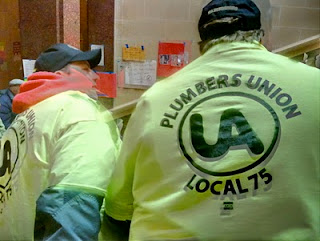On Friday I decided to take a personal day to visit the protests in Madison, WI, a state-wide movement which may be shut down by the time you read this, if the authorities carry through with their promise to clear out the Capitol building. Some of my colleagues arrived on Saturday, the 12th day of demonstrations, where crowds were estimated to have swelled to 70,000 people.
The reason for this journey was to document an event that many in the media and at home (including myself) do not fully understand, though this Q & A-formatted article from USA Today is a decent, if not flawed, start. The controversy is said to be about a "budget repair bill" that Governor Scott Walker wants to pass in order to help balance the state budget. I wanted to cut through the rhetoric of politicians and pundits and talk to (and interview) as many people as possible who were circling the city center in the cold. I started with a simple question: why are you here? Early in the morning, I spoke to Jane and Erin, two elementary education teachers and mothers who were off work that day and with their energetic kids in tow. As I made my way to the Capitol building, I saw other parents point to a statue of Governor Robert "Fighting Bob" LaFollette and tell their children about why LaFollete's progressive "Wisconsin idea" of the early 1900s is somehow still relevant today. I interviewed elevator construction workers and rubbed shoulders with ginormous plumbers and pipefitters as they politely marched passed me. Finally, after the camera batteries depleted, I used my phone to record a conversation with two college students from Milwaukee (who had slept there for two nights) in a dark corner of the nearly deafening Capitol interior. I never saw any counter-protesters, unfortunately. But over and over, the people I spoke to answered my question the same way: we are here because of collective bargaining. Nothing about wages or pensions or layoffs. What makes this such an important issue both nationally and historically that would inspire this kind of response? What do you understand about the protests? What's at stake? How does this fit into a larger story of what has been happening in our country?
The reason for this journey was to document an event that many in the media and at home (including myself) do not fully understand, though this Q & A-formatted article from USA Today is a decent, if not flawed, start. The controversy is said to be about a "budget repair bill" that Governor Scott Walker wants to pass in order to help balance the state budget. I wanted to cut through the rhetoric of politicians and pundits and talk to (and interview) as many people as possible who were circling the city center in the cold. I started with a simple question: why are you here? Early in the morning, I spoke to Jane and Erin, two elementary education teachers and mothers who were off work that day and with their energetic kids in tow. As I made my way to the Capitol building, I saw other parents point to a statue of Governor Robert "Fighting Bob" LaFollette and tell their children about why LaFollete's progressive "Wisconsin idea" of the early 1900s is somehow still relevant today. I interviewed elevator construction workers and rubbed shoulders with ginormous plumbers and pipefitters as they politely marched passed me. Finally, after the camera batteries depleted, I used my phone to record a conversation with two college students from Milwaukee (who had slept there for two nights) in a dark corner of the nearly deafening Capitol interior. I never saw any counter-protesters, unfortunately. But over and over, the people I spoke to answered my question the same way: we are here because of collective bargaining. Nothing about wages or pensions or layoffs. What makes this such an important issue both nationally and historically that would inspire this kind of response? What do you understand about the protests? What's at stake? How does this fit into a larger story of what has been happening in our country?
